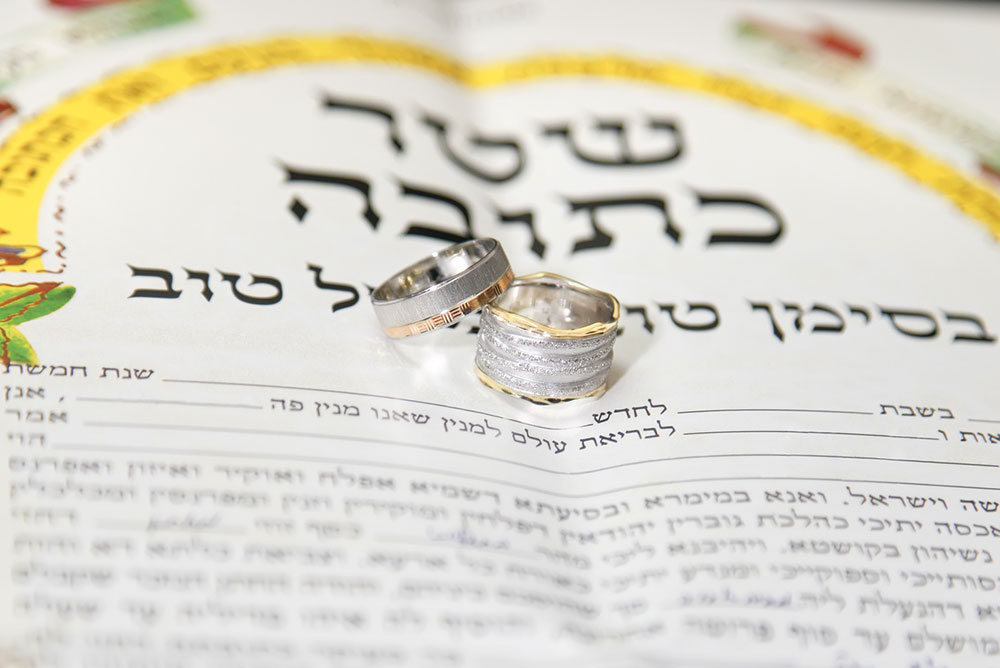Ketubah
Consult a team of veteran and experienced lawyers in the field!
For initial consultation call leave details
And we will get back to you soon
Home » Ketubah
Ketubah
In the state of Israel, marriage and divorce are conducted according to the personal-religious law. This means that when a Jewish couple want to marry, the marriage will be according to the Jewish law. This being said, the procedure of divorce includes not only the divorce itself but other matters regarding division of the common property of the couple as well as matters of child custody, child support and in some cases wife alimony. All these procedures are quite common in divorce cases. However, the divorce procedure sometimes includes lees common procedures such as a claim for the Ketubah.
In this article I’ll talk about the relevant law regarding the Ketubah, I’ll explain what a Ketubah is, what one needs to know about it and does it have legal validity. Let me start by saying that the Ketubah is actually a contract between a husband and a wife that is signed during the wedding, where the husband commits to compensate the wife with a certain sum of money in case of a divorce. But what is the law in a case where a person commits to a very high sum of money in the Ketubah but divorces ten years later? Will he still be committed to the sum in the Ketubah? This question and others that might occupy the thoughts of men, will be answered below.
In the article I’ll also explain shortly what a divorce procedure is and what the proceedings in it include, so as to better explain the base of the Ketubah and the relevant law to the Ketubah.
This article is general and is not a substitute for legal advice. For this purpose, you can contact our office and arrange a consultation meeting.
A few words on the laws of marriage and divorce in the State of Israel
Matters of marriage and divorce are regulated in the state of Israel according to the personal-religious law of the couple. During the British Mandate, before the declaration of independence and the establishment of the state of Israel, the mandatory legislature passed a law called the King’s Order to the Council for the Land of Israel. This law states that the members of the religions in the Land of Israel shall retain the authority to deal with the issue of personal status. After the establishment of the state of Israel, the Rabbinic Courts (Marriage and Divorce) Law, 5713-1953 was legislated. This law regards Jews and replaced the mandatory law. As for the other faiths recognized in Israel, the provisions of the King’s Order to the Council have not been revoked even today, and hence the authority of the Muslim, Christian and Druze courts to deal with the matter of marriage and divorce. The Rabbinic law states that marriage and divorce between Jews will be according to the law of the Torah and the sole jurisdiction in these matter is reserved to the Rabbinic court and no other court can rule in these matters. This means that a Jewish couple who what to divorce in Israel will have to file a claim for divorce to the Rabbinic court. Filling a claim involves a fee and submission of documents such as the marriage certificate and, one must include in the written claim all the relevant facts that caused for the request of the divorce.
The causes of the divorce are not fixed in the Knesset legislation, but are the grounds for divorce that are fixed in the Jewish religious law. Some of the known reasons for divorce are treason, that is, a situation in which a married woman has sex with another man. Another cause for divorce is violence by the woman or by the man. Sexual dissatisfaction also constitutes grounds for divorce under the Jewish religious law. If the cause for divorce is proven before the Rabbinic Court, the latter may order a gGt, or in other words, a divorce.
However, managing a divorce claim in the Rabbinic Court is not a trivial matter. This is a legal action for all intents and purposes. The couple will testify and present evidence to prove the justness of the claim. Note that a divorce claim is heard before a panel of three Dayanim in the Rabbinic Court.
A divorce claim can also be handled in another way which is by agreement. In other words, a couple can arrange between them or with the assistance of a divorce attorney, a divorce agreement. If the couple has signed a divorce agreement, they must submit it to the Rabbinic Court by filing a claim called “A claim to authorize a divorce agreement.” If the divorce is done by agreement the procedure will be much easier than managing a divorce claim from start to finish.
Note that the divorce claim in the Rabbinic court is not the only matter the couple will have to regulate, as I will explain below.
Subjects regarding the divorce procedure
Divorce in the Rabbinic court does bring to a formal separation between the couple, however, they have common property and children who need child support. These matters of custody, child support and property, which are connected to the essence of the divorce, are matters that the couple have to regulate, so as to separate totally. Below, I will review shortly these subjects.
Child support
In Israel, a father is obliged to pay for his children’s needs by the Jewish law, i.e. the Jewish Halachah. There are two categories – by law and charity. By law, the father is obliged to pay regardless of his income. Child support by law includes all the basic necessities needed to raise a child. Up to the age of 6 years, all the expenses are regarded as basic necessities and the father is obliged to pay for them.
Once the child has passed the age of 6 years the father is obliged to pay some of the needs by charity. All the non-basic needs, such as enrichment classes (Hugim), outings etc. the father is obliged to pay according to his income and the court will take in to account the income of the mother and the amount of custody each parent has. This being said, the father still has to pay child support by law for all basic necessities. Child support is an integral part of the divorce procedure and parents have to regulate this matter regarding their common children. Child support matters are heard both at the family court and the Rabbinic court – both courts have jurisdiction regarding this matter.
Child custody
When having common children, the most important issue to determine is the custody of the children. Parents have to decide which one will be the sole custodial parent who will be responsible for the day-to-day bringing up of the children. They must also determine how the visitation rights of the non-custodial parent will be executed. Visitation right are regular times during the week in which the non-custodial parent will spent time with his/her children and will take care of them. Note that custody does not have to be one sided but can be joint. This means that both parent get to spend equal time with the children and share the burden of child support by charity. Child custody is heard in the family court. The court will rule according to the best interest of the child when it comes to custody.
Division of property between a couple
Another important matter that a couple divorcing need to regulate is the matter of common property. During the marriage, the couple have accumulated common property, such as their house, cars etc. when divorcing, the question arises – how to divide?
The answer is set forth in the Financial Relations Between Spouses Law, 5733-1973, which states that when divorcing, the couple’s joint property shall be divided equally between them. The term “joint property” does not include certain types of property such as disability allowance, widowhood allowance and property received by one of the spouses as a gift or before marriage.
The couple may deviate from the above-mentioned default that determines the distribution of joint property, by means of a financial agreement. As part of a financial agreement, the couple can determine a different property distribution. However, it is important to emphasize that a financial agreement is an agreement that must be approved by the Family Court or by a notary, if it is signed between spouses who have not been married.
What is a Ketubah?
Up to now I have established a basis regarding the procedure of divorce is Israel, so as to reach the next stage – the law regarding the Ketubah. The Ketubah is an inseparable part of the divorce procedure. Filing for the Ketubah is a separate cause by the laws of marriage and divorce. Hence, to understand what a Ketubah is and its context, one must understand divorce procedures and the law in Israel, including the Rabbinic court’s jurisdiction in this matter.
The Ketubah can be described as a title deed but it can also be called a contract. Actually, it is both. The Ketubah is a document that the husband signs during the wedding where he commits to compensate the wife with a sum of money in case of a divorce. The Ketubah is meant to insure the wife has a suitable means of existing financially, in case of a divorce. According to the Jewish law, a divorce is a situation where the husband “drives out” the wife. Therefore, the Ketubah was meant to prevent a situation where the wife is driven out of her husband’s house in poverty.
There is no doubt that the Ketubah, which is an ancient document, is not always relevant to our times. On the one hand, there is a kind of harm to women in the Ketubah, a violation that is expressed in the basic perception that the woman is weak and therefore must be protected. On the other hand, there is no doubt that the ketubah has a worthy purpose and is to ensure proper economic existence for a woman who leaves her husband’s house. However, the Ketubah is still a relevant document for a very simple reason: the laws of marriage and divorce between Jews in the State of Israel are still regulated by the personal-religious law. The Ketubah is a part of the marriage ceremony and today it has binding validity, as I shall explain in greater detail below.
Now, let’s go back to the term Ketubah. A Ketubah is indeed an enforceable deed of ownership. In the framework of that title deed, the husband signs a certain payment to be given to the woman at the time of divorce. On the other hand, a Ketubah is also a contract, in which the husband undertakes to compensate the woman in the event of divorce. Moreover, because the contract is also a title deed, then Ketubah is a viable document in a legal action. A woman may file a claim to receive the Ketubah money, as mentioned in Ketubah. It should also be emphasized that a Ketubah is linked to the Consumer Price Index, so that the amount written in it in a particular year will be linked until realization is fulfilled, should it indeed be realized.
A Ketubah is composed of three parts, together forming the Ketubah as a whole. The first part includes the date, place names of the couple and the husband’s commitment to tack care of the wife. In the ketubah, the husband is obligated to indicate a minimal monetary sum, which he will bear at the time of divorce, in favor of the woman. The Halacha establishes a symbolic amount that must be noted in the Ketubah itself. The second part of Ketubah is an addition to the Ketubah. As part of the addition, the husband can add to the minimum amount specified in the Ketubah itself. Respectively, the third part of the Ketubah is the dowry. A dowry is the sum of the assets or the money that the woman brings to the marriage. Incidentally, according to Halacha, when divorcing, the husband must return the dowry to the wife and at the same time he is obliged to compensate her according to written amount as stated.
Caution when writing a Ketubah
In this part I will explain the legal meaning of the Ketubah. To do so, let me tell you a short story so as to illustrate the matter. A man marries a woman, with love and good will. During the ceremony, the husband draws the Ketubah with the Rabbi marring them. In the Ketubah, the husband adds a sum of compensation, at the amount of 1 million NIS. Note that the husband makes a monthly living just over the minimum wages and so does the wife. So, raising 1 million NIS is almost impossible for the husband. After a few years the couple get a divorce. Will the husband be obliged to pay the extreme compensation he wrote in the Ketubah?
The answer is Yes but with reservation. As mentioned, the Ketubah is a realizable document that gives the wife the right to sue her husband. The suit is for payment of a debt and when submitted, the husband has to convince the court why he does not have to pay the amount in the Ketubah. The court can oblige the husband to pay the unreasonable sum, however, the Rabbinic ruling has stated that such sums should be reduced. In out story, the Rabbinic court ruled that the husband should pay less than stated in the Ketubah.
I strongly suggest avoiding unreasonable sums in the Ketubah. Find other ways to impress your wife-to-be, not by stating outrageous sums of money that you might be obliged to pay in the future, since the Ketubah, as mentioned is a legal document.
Claim of Ketubah – in theory and practice
A claim for a Ketubah is, as stated, a legal claim for all intents and purposes. The authority to deal with claims for the Ketubah is reserved for the Rabbinic Court, since a Ketubah suit is a claim that falls under the category of “matters of marriage and divorce” in accordance with the Jurisdiction Law of the Rabbinic Courts mentioned above. The Supreme Court ruled as follows: “The ruling gives a broad interpretation of the term “marriage matters”, which appears in Article 51 (1) of the Order of the King to the council in its section 1 of the Rabbinical Courts Jurisdiction Law, including all the rights and obligations deriving from the status of marriage, including the monetary rights and obligations, i.e. any monetary claim derived from the status of marriage, including claiming for the Ketubah , Is included within the meaning of the term “marriage matters”. Therefore, the matter of the claim of the Ketubah is materially in the jurisdiction of the Rabbinic Court “(HCJ 9858/07 The Rabbinical Court).
In other words, a wife who wants to file for her Ketubah should do so by filing a claim to the Rabbinic court. To the claim itself you need to add a copy of the Ketubah and detail the relevant fact. The husband can submit a statement of defense and make statements that might prove that the wife is not entitled to her Ketubah, or might be entitled to a lower sum. As in divorce claims, the hearing for a Ketubah will be done before 3 Dayanim at the Rabbinic court.
Loss of eligibility for the Ketubah
A question that often arises is Can a woman lose her right to a Ketubah? The answer is yes. There are situations in which a woman can lose her right to receive Ketubah money. For example, in the case of a traitorous woman. In other words, the wife of a man who had sexual relations with another man would not be entitled to her Ketubah. A woman who transgresses the Jewish religion, that is, encourages her husband to violate religious commandments and more, may lose her right to her Ketubah. Beyond that, there are other situations in which a woman will not be entitled to her Ketubah, but I will not elaborate on them now.

To sum
In this article, I explained what is a Ketubah. I explained that a Ketubah is a contract and a deed of ownership. I also explained that a Ketubah is a viable document, by virtue of which a woman can file a legal action against her husband during divorce. Written claims are submitted to the Rabbinic Court, which is solely authorized to deal with matters of marriage and divorce. Beyond that, there are cases where a woman can lose her right to her Ketubah. In conclusion, I would like to recommend going to a divorce lawyer regarding the Ketubah and advice on cases related to it.
Consult with a team of veteran and experienced lawyers in the field!
For initial consultation call leave details
And we will get back to you soonOther areas of practice:

You are invited to come to a counseling meeting where we will look at the existing situation and provide answers and explanations to your questions and a recommendation what we think is best for you are what to do.
For an initial consultation call now: 077-2306101







